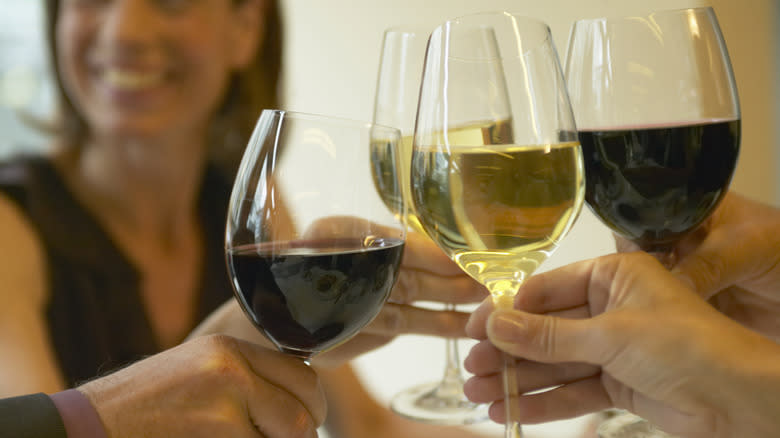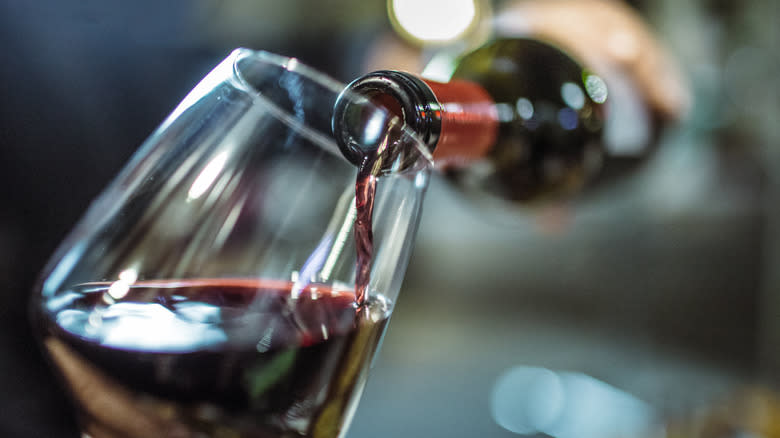Does The Glass You Use For Wine Really Matter? We Asked A Specialist

For wine beginners or novices, picking out the correct wine for your dinner or special occasion can be intimidating enough. But if you've invested in a delicious, quality bottle of wine, you shouldn't dilute its greatness by pouring it into any old glass. According to Matt Strauch, general manager and wine director of Noble Riot in Denver, Colorado, the vessel you use to serve your wine has a huge impact on the drinking experience.
"Good glassware is designed for small pours, to either trap or release aromas, and to expose the wine to oxygen appropriately," Strauch told Daily Meal. Although it may be tempting to pour a large glass of your new favorite wine, you may be missing out on key aromas and flavors. And you also can't trust that one nice wine glass will fit all options equally. It's key to choose the right glassware based on the kind of wine you're drinking, which Strauch helps to explain.
Read more: 10 Of The Healthiest Beers You Can Drink
The Best Kind Of Wine Glass For Different Wines

In general, Strauch suggests that you should ideally use thin wine glasses when possible. "Thin glasses are preferable for a better flow between the wine and your palate, and they also add an elegant touch," Strauch advised. Thin lips, which refers to the lips of the wine glass itself, are ideal for this elegance and unobstructed flow that Strauch refers to, so you can be familiar with the three wine aroma classifications: primary, secondary, and tertiary.
"Delicate, aromatic wines like Champagne, riesling, and pinot noir need glasses with ample room to open up while trapping the aromas in a tapered bell shape," Strauch explained. Since these wines have delicate fragrances, they need a wine glass that has the best of both worlds. A wide opening allows easy access to oxygen, while the narrow tapering of the glass towards the stem keeps a fair amount of aromas trapped.
Bolder wines, however, require more space to free their complexities. "Fuller-bodied wines, especially those aged in oak, benefit from Bordeaux-style glasses, which offer volume and surface area to release their aromas," Strauch elaborated. Bordeaux-style glasses feature a larger bowl. By filling the glass up to the widest part of the bowl, you leave enough oxygen above for the wine to breathe. Some popular fuller-bodied red wines include cabernet sauvignon and malbec. But some bolder white wines may benefit from a Bordeaux-style glass as well, such as chardonnay or chenin blanc.
Tips For Proper Handling Of Your Wine Glass

Once you have the correct type of wine glass, you've got to be prepared to hold it properly so you don't tamper with the delicate aspects of your wine. "Ideally, handle your glass by the stem to prevent warming the wine with your hand, which can affect the intended experience, especially with cold or cellar-temperature wines," Strauch cautioned. Luckily, the stem and the base of the wine glass have no temperature impact on the wine in the bowl. So if you're drinking wine to enjoy its complex, subtle notes, that's a good enough reason to avoid using stemless glasses.
Furthermore, holding your wine glass by the stem avoids any smudging or marks on the glass, and Strauch considers avoiding unwanted marks important. "Always ensure your glass is free from off-odors and film from soap or musty polishing towels," Strauch advises. The steam technique for spotless wine glasses is a great alternative to using a towel so you can ensure your wine glasses are clean without the wine's aromas and taste being altered.
Strauch acknowledges that personal preference can also affect the type of wine glass you use. "However, wine drinking should ultimately be about enjoyment, so while proper technique enhances the experience, personal preference also matters," Strauch said. To enhance your wine-drinking experience, follow Strauch's tips, but don't stress if you accidentally grab a wine glass by the bowl instead of the stem. Cheers to better wine drinking!
Read the original article on The Daily Meal.


